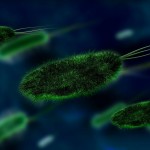Has it happened to you that you’ve met a handsome person, but something just didn’t click? Was there a person that had something that you simply couldn’t resist? Sometimes we call this chemistry, but does it really have anything to do with chemicals? Science says yes!

It wasn’t until 1995, when Claus Wedekind, professor at University Bern in Switzerland asked his male students to wear cotton T-shirts two nights in a row, not to use any perfumes and avoid smelly stuff in general. He put the T-shirts into boxes and asked female students to smell them and rate how “sexy” they smelled. It turned out that women preferred the smell of T-shirts belonging to students with most different MHC genotype with the p-value being smaller than 0.001! Does that mean that two MHC genotypes are all you need to predict how sexually compatible you are with someone?
Well, it does make scientific sense. The more genetically different our sexual partner is, the less likely it is that children will have recessive genetic disorders. Also having two different sets of genes helps our immune system to fight off more pathogens, which would explain why MHC is involved in mate preferences. But nobody really knows how does it work and what exactly it is that smells sexy.
Since 1995 there were many other studies in many different settings. Some confirmed the results, some were inconclusive and some actually showed the reverse effect. Interestingly women who were taking contraceptive pills preferred more similar genotypes – family. And since hormonal contraceptives simulate pregnancy it does make sense that pregnant women are not really looking for a potential mate, but for family, where they feel safe.

It is hard to say what role genetics is playing in sexual attraction in humans, especially since the attraction seems to be determined by smell. We are all showering with soap, wash our clothes with softeners and eat dishes that can leave very specific odours. But it seems that there is some old mechanism still in play. So next time you find someone irresistible, you can blame your genes. And if you are saying “there is chemistry between us” you are scientifically correct.
Klemen Zupancic, PhD, BioSistemika LLC










